| 208 history
the beginning |
|
|
|
| ©
words and pictures:
taken
from the magazine 'Radio Luxembourg 208 - 50 pop years' published in 1979
by IPC Magazines Ltd., London
|
| |
| It all
started in 1929, when a group of businessmen began to turn the dream of
succesful commercial radio into a reality: |
|
| They took
over a small private amateur radio station that had broadcast intermittently
for some years. And, in the years up to the war, Radio Luxembourg helped
commercial radio grow throughout Europe. |
|
| Bob Danvers
Walker, one of the first announcers connected with the British Service,
recalls the arrival of Luxembourg as the most exciting development of the
decade. |
|
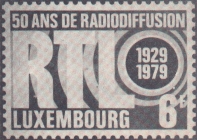
|
| |
|
|
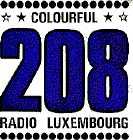
|
| Fifty years
later, Radio Luxembourg, or RTL as it has become internationally-known,
is the number one radio station for Britain's young audience. The radio
and television network is the biggest taxpayer in a country rich with steel
& coal. |
| It
has been success all the way for over 50 years - with just one major
'hiccup' - that was in 1939, the year Europe was gripped by a Second World
War. Luxembourg was occupied by the Germans, and the radio used for propaganda
purposes. Remember Lord Haw Haw's famous broadcasts? These were relayed
from Radio Hamburg in Germany and are easily recalled by those who lived
in Britain during the War years. |
|
| |
|
|
| It was
a handful of very determined men who picked up the pieces after the War.
But the station was soon back on the air and success came again at the
end of the Forties. Throughout the Fifties, Radio Luxembourg was established
as a household name in Britain and over the years just about every major
DJ was to be associated with the station. The list is impressive, to say
at least - Teddy Johnson, Pete Murray, David Jacobs, Alan Freeman, Jimmy
Young, Jack Jackson, Brian Mathew, Sam Costa, Keith Fordyce and Jimmy Savile. |
| It all
started for Jimmy with Luxembourg: "What happened was this. I was a successfull
dance hall manager when somebody said to me: 'When you're next in London,
call round to Luxembourg's studios and see how their record shows are done.'
Well, going into radio had never crossed my mind - but that's how it all
began for me." |
| All these
DJs speak with affection of Radio Luxembourg. Pete Murray says he went
out for six months... and stayed five years. |
|
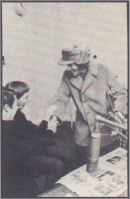
Jimmy Savile
in the studio, greeting Pete Brady & Simon Dee
|
| |
|
|

Teddy Johnson,
a DJ on Luxembourg in the early Fifties
|
| And the
feeling was the same among the 208 team over the long years... none of
the DJs regard it as simply a job. It always has been a truly 'live' radio.
Radio with an air of informality no-one else has quite ever been able to
match. During the Fifties, other operations were growing within Radio Luxembourg.
The French and German services were gaining audiences and became number
1 in their countries. |
|
| Teddy Johnson
and Pete Murray were both with Luxembourg in the Fifties. Teddy recalls:
"For six nights out of seven, I was the only British announcer on the station
and I'd start the evening's broadcast at 10.30 p.m." |
|
| Hughie
Green's
Opportunity Knocks started with Luxembourg. "I remember
the legendary
Top 20 show starting on Sunday nights. I was the first
DJ to introduce it and it was to become the radio station's top audience
programme - later of course with Luxembourg's longest serving DJ Barry
Alldis. |
|
| |
|
|
| Those who
can remember the early days of Luxembourg will recall that the British
Service was then broadcasting on Long Wave. It was the historic move to
208 Medium Wave which made Pete Murray stay in Luxembourg. "The move to
Medium Wave resulted in us getting a tremendous amount of mail from listeners
and it greatly increased our advertising revenue. And for the 1st time,
DJs became stars." |
| And Luxembourg
created those stars over the years. Top DJs who started on 208 include
Tony Blackburn, Paul Burnett, Kid Jensen and Peter Powell. Tony Brandon,
later one of the BBC's top DJs, joined Luxembourg at a very important time
in the radio station's development. The 'pop pirates' had arrived in the
mid-Sixties and 208 was to change format to remain where it always has
been - leading the field. |
| At this
time, the DJs in Luxembourg were contributing more and more to Luxembourg's
total air time, as pre-recorded sponsored shows from London became less
and less frequent. |
|
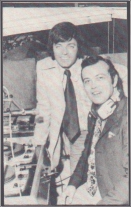
Bob Stewart
(right)
interviewing
Tony Blackburn
|
| |
|
|
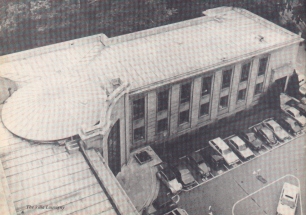
|
| In fact,
at the beginning of the Sixties, the British Service's newly arrived managing
director, Alan Keen, made radical changes in format, terminating directly-sponsored
record company shows. |
|
| Instead,
Luxembourg adopted 'top forty' radio, a format which has enabled the station
to set trends. During the Seventies 208 has reflected British trends in
progressive rock, contemporary pop, new wave and disco. |
|
| And it
all comes from the Villa Louvigny, the headquarters of RTL, set in a beautiful
park in the Grand Dutchy. Around the villa are the 999 square miles that
make up Luxembourg, bounded by Belgium, France and Germany. |
|
| |
|
|
| In 1979,
the British Service took a new role by providing a weekday afternoon service
to listeners in Luxembourg and parts of Germany, France and Belgium. For
some of the 208 team in the Grand Dutchy, it is their first taste of day-time
radio for years. Called 'RTL-Community' the service is a local radio station
in Luxembourg. |
| |
| Look in
during the afternoons and you're likely to see two DJs on RTL-Community,
presenting records, local news and magazine items for listeners. Which
is very different from the more aggressive evening pop service co-ordinated
by programme director Tony Prince. |
| |
| But then,
the services of RTL are different in their design and appeal. Both the
French and the German Services run pop programmes, alongside current affairs,
quiz shows and the like. In each of its broadcasting areas RTL is unashamedly
aiming for the largest possible audience. It is estimated that more people
than 40 million at least once a week, regularly tuned in to Luxembourg.
Unbelievable, isn't it? |
|
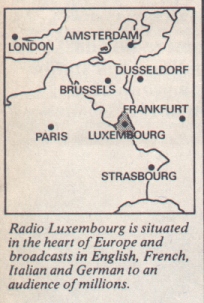
|
| |
|
|
|
|
| ©
words and pictures:
taken
from the magazine 'Radio Luxembourg 208 - 50 pop years' published in 1979
by IPC Magazines Ltd., London
|
| |
|
|
| |
